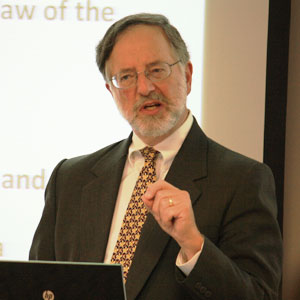Information
Venue
Start
End
18 October 2011 | Joint Seminar
Climate Change and International Order: What Comes After Agenda 21?
Introduction
 The 1992 “Earth Summit” in Rio de Janeiro launched the world into an productive era of environmental conference diplomacy. The Commission on Sustainable Development began its annual meetings at UN headquarters on implementing the vision of sustainable development agreed to in Agenda 21. The Conference of the Parties for the UN Framework Convention on Climate Change debated how States could mitigate green house gas emissions and adapt to the effects of climate change; next December in South Africa, these debates will continue on creating a “Green Climate Fund” and on rules for “Reducing Emissions from Degradation and Deforestation, with conservation” or ” REDD+.” Nations just last year established the International Renewable Energy Agency (IRENA) in Abu Dhabi and under the Convention on Biological Diversity agreed in Nagoya to strategic plan shared by each of the biodiversity-related treaty organizations. But, progress masks problems. The Great Recession of 2008 revealed defects in the Bretton Woods financial institutions, and retards the development of green financing. Expansion of emission trading has stalled, while natural resources exploitation grows. This October the world reaches a population of 7 billion people, with 2 billion more expected in the next fifty years. Experts foresee a need to redefine human wellbeing, if humans and nature are to co-exist in health as this century unfolds (see “Decoupling Natural Resource Use and Environmental Impacts from Economic Growth,” at www.unep.org/resourcepanel). Coping with such competing trends requires rethinking the assumptions of Agenda 21, and moving beyond “sustainable development” to a new paradigm. Negotiations leading up to the “Rio+20” Conference in June 2012 grapple with such issues. Prof Robinson’s lecture explored the stakes we share amidst the world-wide changes of climate and governance.
The 1992 “Earth Summit” in Rio de Janeiro launched the world into an productive era of environmental conference diplomacy. The Commission on Sustainable Development began its annual meetings at UN headquarters on implementing the vision of sustainable development agreed to in Agenda 21. The Conference of the Parties for the UN Framework Convention on Climate Change debated how States could mitigate green house gas emissions and adapt to the effects of climate change; next December in South Africa, these debates will continue on creating a “Green Climate Fund” and on rules for “Reducing Emissions from Degradation and Deforestation, with conservation” or ” REDD+.” Nations just last year established the International Renewable Energy Agency (IRENA) in Abu Dhabi and under the Convention on Biological Diversity agreed in Nagoya to strategic plan shared by each of the biodiversity-related treaty organizations. But, progress masks problems. The Great Recession of 2008 revealed defects in the Bretton Woods financial institutions, and retards the development of green financing. Expansion of emission trading has stalled, while natural resources exploitation grows. This October the world reaches a population of 7 billion people, with 2 billion more expected in the next fifty years. Experts foresee a need to redefine human wellbeing, if humans and nature are to co-exist in health as this century unfolds (see “Decoupling Natural Resource Use and Environmental Impacts from Economic Growth,” at www.unep.org/resourcepanel). Coping with such competing trends requires rethinking the assumptions of Agenda 21, and moving beyond “sustainable development” to a new paradigm. Negotiations leading up to the “Rio+20” Conference in June 2012 grapple with such issues. Prof Robinson’s lecture explored the stakes we share amidst the world-wide changes of climate and governance.
About the Speaker
Prof Nicholas A Robinson founded the environmental legal studies program at Pace Law School in 1978, including its Environmental Litigation Clinic in 1985, which was set up to represent the Hudson Riverkeeper. He is Pace’s University Professor for the Environment, and also teaches at the Yale School of Forestry & Environmental Studies. Prof. Robinson authored New York’s wetlands legislation and the State’s wild bird law. He served from 1983-85 as the Deputy Commissioner and General Counsel for the NYS Department of Environmental Conservation and was the first chairman of the Hudson Valley Greenway Conservancy, established by the State legislature. He is the author of many books and articles, including a new text on Climate Change Law. The World Conservation Congress in 1994 elected him to chair the Commission on Environmental Law of the International Union for the Conservation of Nature (IUCN), the highest professional position in environmental law globally. He also served as IUCN’s Legal Advisor for a decade. He has lectured abroad on environmental law in more than 100 nations, helped draft the United Nation’s World Charter for Nature, and worked on the development of the Convention on Biological Diversity. For 20 years he was a US government delegate to the USA-USSR environmental law negotiations, and he currently serves on the Environment & Social Advisory Council to the European Bank for Reconstruction & Development in London, building environmental programs in the former Society Union region. Forty years ago, he served on the Legal Advisory Committee to the President Council on Environmental Quality, establishing the procedures for the environmental impact assessment process. Locally, he serves on the steering committee for the Pocantico River Watershed Conservancy and for eight years chaired the Planning Board of the Village of Sleepy Hollow. He is a graduate of Brown University (Phi Beta Kappa) and Columbia University School of law.
Presentation
To download Prof Robinson’s presentation in PDF format, click here.


